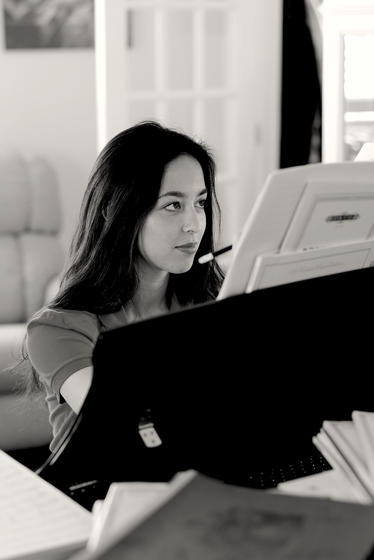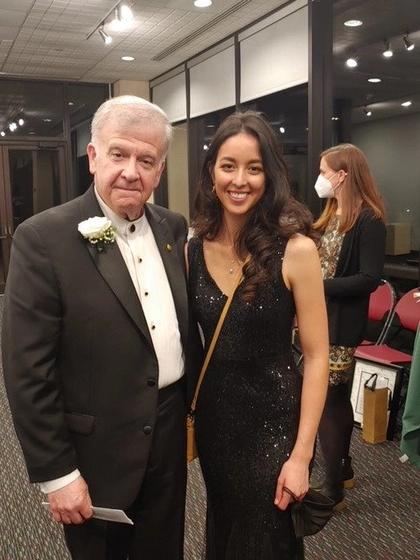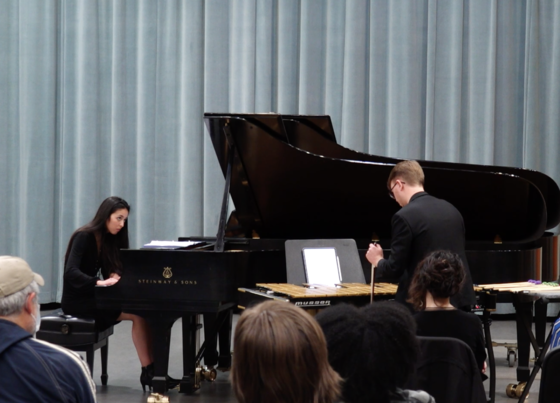In This Story
When Anne Catherine “Kitty” Fields (Music, 2023) isn't at her piano composing, she is engaged in a wide array of interests, from studying neuroscience to reading Carl Jung to enjoying bird songs on nature walks, in addition to cooking and baking.

On the surface, her many interests may seem unrelated, but Fields finds inspiration in her non-musical endeavors, which feeds her as an artist. Fields says that process of composing is akin to seasoning a red sauce. “You taste it and say ‘The prosciutto adds depth, but it needs some basil and parsley to brighten it, with a dash more of red wine and a pinch of salt, I think we’ll be closer to what we want.’ “said Fields. “In the same way, composers have agency to say what a piece needs: ‘The bass drum will reinforce this downbeat, but we need the reeds and flutes to brighten the texture, with bells doubling here and pianissimo crotales, I think we’ll be closer to what we want.’”
With several impressive compositions under her belt, including the premiere of her first work for a large ensemble in the spring of 2022, Fields stands on the cusp of her senior year, reflective of the road that led her to Mason and enthusiastic about what lies ahead.
The native Northern Virginian began composing small-scale works in high school. Her piano teacher, the classical pianist and church organist Olga Teulter, introduced Fields to the works of Bach, Mozart, Chopin, Rachmaninov, Tchaikovsky, Ravel, and more. The richness and depth of their music profoundly impacted how Fields listens to music. Discovering the meaningful ways that other composers used musical elements to express ideas from their faith, bringing the influence of nature into a piece and evoking movement and emotion from the listener laid the foundation for Kitty’s understanding of how compositions are devised. Repeatedly listening to pieces and growing her understanding of their structure enhanced her desire to learn, driving her to discover more about theory and harmony so that her own ideas could come to life on the page. Another crucial influence was the Japanese composer Joe Hisaishi, best known for writing the soundtracks to films produced by acclaimed animation company Studio Ghibli. Fields says she “was always fascinated by the way a score could bring out the emotional undertones of a scene and suggest to the viewers where to direct their attention through auditory cues.”
Fields had countless ideas for new music but knew that continuing to study would bring her to a place where she could transform those ideas into fully-fledged works.
Putting what she hears in her mind's ear onto paper has taken training and patience. Repetition and exploration are central to her process. She plays through musical ideas multiple times at the piano as she brings the various elements into alignment, spending time with the music to discover whether it conveys what she intends in each piece, before she can begin to develop it fully. She then weaves these musical ideas together, creating colors through the orchestration, and conveying emotion through the pacing and structure of the piece.

Fields undertook her first composition explorations as a local high school student attending the Mason Community Arts Academy summer composition workshops with acclaimed composers Mark Camphouse and Vincent Oppido. Professor Camphouse retired in 2022 after 16 years with the Dewberry School of Music, while Oppido, a Mason alumnus himself, is an award-winning composer with credits that extend from video games and film scores to the Academy Awards ceremonies, in addition to his concert music catalog. She says, “I clicked with Professor Camphouse immediately and saw I had so much to learn from his vast experience in the field; his incredible talent and expertise in composing and conducting; and his warm and kind spirit.” Fields met Dr. Anna Balakerskaia, her current piano teacher, through Teulter and was “completely in awe of her musicality and intuition.” When it came time to select a university to continue her studies, Fields' choice of Mason made perfect sense.
Fields received her first song commission from Mason's own Professor Joseph Walsh in 2021, “The Hand and the Light,” in which she performed and recorded the vocals and piano accompaniment. The Fantasy for Piano and Wind Symphony is Field's first large ensemble work, and her eloquence is as apparent in her writing as it is in her musical compositions. She describes Fantasy as “partly inspired by reading the memoirs of the aviator, writer, and poet Antoine Saint-Exupery and by various stories told by pilots and adventurous souls [I’ve] encountered personally. In this work, Fields attempts to capture the exhilaration and profound beauty of soaring through the heavens and the loneliness that may haunt someone who is never in one place for long.”
The second movement of Fantasy, titled “Night Flight”, is a favorite in her portfolio.
“It evokes the unease of flying over a large body of water at night. The piece plays with fear, light, darkness, life, and death. The slow, deliberate beginning of the movement feels as though it is suspended in the air, only drifting, as an ascending motive makes gradual entrances. The ascending motive is then juxtaposed with the Lux Aeterna Gregorian chant from the Requiem Mass (played by the piano), almost like a prayer for light to scatter the strangely inviting darkness. The low brass comes in, roaring to depict the depth of the water, an abyss that could swallow one instantly. Throughout the piece, there are many images and moods that Fields leaves open to the listener to interpret. One thing is for sure, though: at the end, when the Lux Aeterna takes its final form as a resplendent fanfare, the light does not merely illuminate the darkness but shatters all fear.”
Fields' college career has been marked by the pandemic. She says, “Lockdowns happened the second semester of my freshman year, and when we came back to school after a year and a half of trying to make music over Zoom, I realized what I had missed through most of my time here: the forging of musical relationships through collaboration and ensemble playing.” She explains that the most rewarding part of being a composer is working in partnership with other musicians who breathe life into her creations. Fields got to experience this in full last April when the Mason Wind Symphony premiered Fantasy. She says, “The energy was incredible that night. I also performed the piano part, which meant I not only got to hear my peers play my music, I also got to play with them. The experience of that musical synergy is unforgettable!”

Her summer has continued to build on the energy of collaboration and the enriching relationships that evolved during her time at Mason.
Two of her compositions have been accepted by C. Alan Publications for distribution, one of which is her Fantasy. The other is titled Atmospheric Study No. 1, for piano and vibraphone—a minimalist piece that experiments with the timbres the two instruments can create together, at times focusing on one instrument, at others blending the two into an indistinguishable sound. Fields attended the National Band Association Young Composer/Conductor Mentor Project as an observer just a few weeks ago. The program is the brainchild of Mark Camphouse, offering young composers and conductors a three-day intensive partnership with an experienced working mentor from the field. At the event, Fields connected with renowned composers Thomas Duffy, Viet Cuong, and Kevin Day, among others. Currently, Fields is working on a setting for soprano and orchestra of the beloved American classic “Stopping by Woods on a Snowy Evening,” by Robert Frost.
For the rest of the summer, she hopes to write lots of chamber music that will be performed during her senior recital in the spring of 2023, after which she plans to continue her studies in graduate school. Fields' goal for her final year at Mason is to continue to foster as much of this collaboration as possible and continue cultivating these supportive and transformative friendships through the binding power of music.
